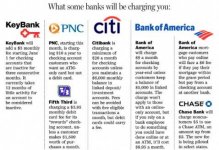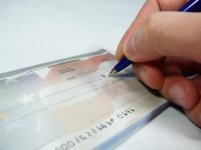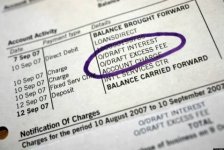capslocked
Forum Veteran
- Joined
- Apr 14, 2015
- Posts
- 2,125
- Reaction
- 770
- Points
- 999
While you’re most likely grateful to your bank for keeping your hard-earned cash safe, you’re probably not at all thrilled when your bank takes that money in the form of a service charge or fee. With a little research and pre-planning, you can avoid those dreaded charges and even come out ahead with some interest.
Save your money by trying these six tips for keeping banking costs down.
1. Shop around for banks

Yikes, look at all those fees! There are plenty of banks out there ready and willing to offer you a good deal for a chance to have you and your money as a customer. Look around for a bank or savings account and loan that offers the lowest overall fees and the highest interest rates.
In addition to local brick and mortar banks, check out online-only financial institutions that often offer much higher interest rates and no fees at all.
2. Look for free checking
While many banks charge for checking accounts, there are those that don’t. Avoid paying a bank for the privilege of holding your money. Look for a financial institution that charges no checking fees or one that offers free checking if you open another account, such as savings. When you do find an account that is free as long as you keep a certain balance, be realistic about the required amount. If you go below the threshold, the penalties can be stiff. Also choose an account that allows you the opportunity to write unlimited checks.
3. Buy cheap checks

Save the bunnies, sunsets and brand themes for your computer screensaver. Generally, the more checks you buy, the cheaper they are, so purchase generic checks in bulk. Some banking institutions also don’t even charge you for checks that contain their logo and theme.
4. Use the correct ATMs
Using your bank’s debit card at another financial institution’s ATM usually means a stiff fee. For instance, you can be charged as much as $2 to get out $20, which is a whopping 10 percent. Choose a bank that has ATMs that are convenient for you, so you don’t end up “going out of network” to another bank’s ATM. Or better yet, get a debit card from an online bank that reimburses any ATM fees you incur from other banks.
5. Maintain overdraft protection

Of course, you don’t plan on ever overdrawing your checking account, but it could happen. Forget to enter a check or that you have an automatic wí†hdráwal coming out, and you’ve got checks bouncing all over the place. Avoid your bank’s hefty overdraft charge (and the fees charged to the recipients of your checks by their banks) by maintaining an overdraft protection account.
Make certain that your overdraft protection account is a savings account and not a high interest line of credit, which costs you. Also ask about any fees associated with using the overdraft protection, as some banks charge for that—although it is generally a smaller fee than the dreaded overdraft charge.
6. Take advantage of direct deposit
Because they have a guarantee that you’ll be depositing money, many banks will waive fees if you have your paycheck automatically deposited into your checking or savings account. This and many banking perks aren’t always automatic, though. If you currently have direct deposit but aren’t enjoying free checking, call your bank and ask for it. It may be a case of setting up your account a certain way.
Used together, all of these relatively simple steps can mean big savings over time. If you take advantage of all the perks your bank has to offer, you can realistically pay no fees and collect interest.
Save your money by trying these six tips for keeping banking costs down.
1. Shop around for banks

Yikes, look at all those fees! There are plenty of banks out there ready and willing to offer you a good deal for a chance to have you and your money as a customer. Look around for a bank or savings account and loan that offers the lowest overall fees and the highest interest rates.
In addition to local brick and mortar banks, check out online-only financial institutions that often offer much higher interest rates and no fees at all.
2. Look for free checking
While many banks charge for checking accounts, there are those that don’t. Avoid paying a bank for the privilege of holding your money. Look for a financial institution that charges no checking fees or one that offers free checking if you open another account, such as savings. When you do find an account that is free as long as you keep a certain balance, be realistic about the required amount. If you go below the threshold, the penalties can be stiff. Also choose an account that allows you the opportunity to write unlimited checks.
3. Buy cheap checks

Save the bunnies, sunsets and brand themes for your computer screensaver. Generally, the more checks you buy, the cheaper they are, so purchase generic checks in bulk. Some banking institutions also don’t even charge you for checks that contain their logo and theme.
4. Use the correct ATMs
Using your bank’s debit card at another financial institution’s ATM usually means a stiff fee. For instance, you can be charged as much as $2 to get out $20, which is a whopping 10 percent. Choose a bank that has ATMs that are convenient for you, so you don’t end up “going out of network” to another bank’s ATM. Or better yet, get a debit card from an online bank that reimburses any ATM fees you incur from other banks.
5. Maintain overdraft protection

Of course, you don’t plan on ever overdrawing your checking account, but it could happen. Forget to enter a check or that you have an automatic wí†hdráwal coming out, and you’ve got checks bouncing all over the place. Avoid your bank’s hefty overdraft charge (and the fees charged to the recipients of your checks by their banks) by maintaining an overdraft protection account.
Make certain that your overdraft protection account is a savings account and not a high interest line of credit, which costs you. Also ask about any fees associated with using the overdraft protection, as some banks charge for that—although it is generally a smaller fee than the dreaded overdraft charge.
6. Take advantage of direct deposit
Because they have a guarantee that you’ll be depositing money, many banks will waive fees if you have your paycheck automatically deposited into your checking or savings account. This and many banking perks aren’t always automatic, though. If you currently have direct deposit but aren’t enjoying free checking, call your bank and ask for it. It may be a case of setting up your account a certain way.
Used together, all of these relatively simple steps can mean big savings over time. If you take advantage of all the perks your bank has to offer, you can realistically pay no fees and collect interest.
Attachments
-
You do not have permission to view the full content of this post. Log in or register now.